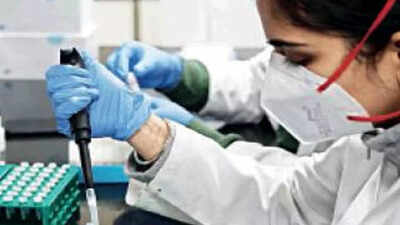Top Searches
- News
- City News
- bengaluru News
- Karnataka govt to seek Centre’s approval for four labs
Karnataka govt to seek Centre’s approval for four labs
Karnataka govt to seek Centre’s approval for four labs

Only two laboratories in Karnataka — one each at National Centre for Biological Sciences (NCBS) and Nimhans — have been approved by INSACOG. (Picture: Bloomberg)
BENGALURU: A recent communication from the Centre to the state, which says genomic sequencing can be conducted only in labs approved by Indian SARS-CoV-2 Genomics Consortium (INSACOG), has left Karnataka in a spot of bother.
Only two laboratories in Karnataka — one each at National Centre for Biological Sciences (NCBS) and Nimhans — have been approved by INSACOG. But, with the detection of the Omicron variant, the plan is to conduct whole genomic sequencing (WGS) on international travellers, besides all cases in clusters and random infections from the community.
This means the load on the labs will rise. During the peak of the second wave, the state government had announced that it would set up six genome sequencing labs at government medical colleges across the state — Mysuru, Bengaluru, Shivamogga, Hubballi, Mangaluru and Vijayapura.
In the last week of November, it had completed procurement of equipment for four labs in government medical colleges — Hassan, Belagavi, Mysuru, and Atal Bihari Vajpayee Medical College (Bowring and Lady Curzon hospital) in Bengaluru. These would now have to be approved by INSACOG.
“With the Centre issuing new guidelines, the state government will seek approval to conduct genomic sequencing at these four medical colleges,” said D Randeep, health commissioner.
Health department authorities say a minimum 30 samples are sent for genomic sequencing every day to detect variants of the virus in circulation in the state. While only two labs have approval, four government centres conduct WGS. The lab at Jawaharlal Nehru Centre for Advanced Scientific Research (JNCASR) is attached to Nimhans, and the IISc lab attached to National Centre for Biological Sciences.
“The load isn’t very high now since cases are low. And even among samples, the ones that qualify for WGS are even fewer,” said virologist Dr V Ravi, who is also the state nodal officer and chairman, Committee for Covid-19 whole genome sequencing.
Only swab samples with a cycle threshold (CT) value below 25 qualify for genomic sequencing, as the viral load is higher in samples with low CT value. The CT value indicates the number of cycles in the RT-PCR test needed to amplify viral RNA to reach a detectable level.
“Equipment has been installed in four districts and staff now need to be trained,” said Dr Ravi. “It requires two technicians, a scientist and a data entry operator. I am not sure if recruitment and appointments have been done. They will have to be trained at least for a week at NCBS.”
Going by the Centre’s new rule, the state cannot send samples for genomic sequencing to private labs such as Molecular Solutions and Strand Biosciences. These two labs had been conducting WGS on random samples from private hospitals and some samples from BBMP’s PHCs pro bono. “We’ve sought recognition for these two labs,” said Randeep.
Only two laboratories in Karnataka — one each at National Centre for Biological Sciences (NCBS) and Nimhans — have been approved by INSACOG. But, with the detection of the Omicron variant, the plan is to conduct whole genomic sequencing (WGS) on international travellers, besides all cases in clusters and random infections from the community.
This means the load on the labs will rise. During the peak of the second wave, the state government had announced that it would set up six genome sequencing labs at government medical colleges across the state — Mysuru, Bengaluru, Shivamogga, Hubballi, Mangaluru and Vijayapura.
In the last week of November, it had completed procurement of equipment for four labs in government medical colleges — Hassan, Belagavi, Mysuru, and Atal Bihari Vajpayee Medical College (Bowring and Lady Curzon hospital) in Bengaluru. These would now have to be approved by INSACOG.
“With the Centre issuing new guidelines, the state government will seek approval to conduct genomic sequencing at these four medical colleges,” said D Randeep, health commissioner.
Health department authorities say a minimum 30 samples are sent for genomic sequencing every day to detect variants of the virus in circulation in the state. While only two labs have approval, four government centres conduct WGS. The lab at Jawaharlal Nehru Centre for Advanced Scientific Research (JNCASR) is attached to Nimhans, and the IISc lab attached to National Centre for Biological Sciences.
“The load isn’t very high now since cases are low. And even among samples, the ones that qualify for WGS are even fewer,” said virologist Dr V Ravi, who is also the state nodal officer and chairman, Committee for Covid-19 whole genome sequencing.
Only swab samples with a cycle threshold (CT) value below 25 qualify for genomic sequencing, as the viral load is higher in samples with low CT value. The CT value indicates the number of cycles in the RT-PCR test needed to amplify viral RNA to reach a detectable level.
“Equipment has been installed in four districts and staff now need to be trained,” said Dr Ravi. “It requires two technicians, a scientist and a data entry operator. I am not sure if recruitment and appointments have been done. They will have to be trained at least for a week at NCBS.”
Going by the Centre’s new rule, the state cannot send samples for genomic sequencing to private labs such as Molecular Solutions and Strand Biosciences. These two labs had been conducting WGS on random samples from private hospitals and some samples from BBMP’s PHCs pro bono. “We’ve sought recognition for these two labs,” said Randeep.
FacebookTwitterLinkedinEMail
Start a Conversation
end of article

